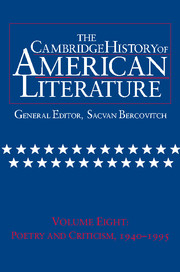Book contents
- Frontmatter
- Introduction
- Poetry, Politics, and Intellectuals
- Introduction
- 1 The Place of Poetry in the Culture, 1945–1950
- 2 Politics
- 3 Rear Guards
- 4 Avant-Gardes
- 5 Authenticity
- 6 Translation
- Conclusion: The Place of Poets, 1995
- Appendix I: Biographies of Poets
- Criticism since 1940
- Chronology 1940–1995
- Bibliography
- Index
Introduction
from Poetry, Politics, and Intellectuals
Published online by Cambridge University Press: 28 March 2008
- Frontmatter
- Introduction
- Poetry, Politics, and Intellectuals
- Introduction
- 1 The Place of Poetry in the Culture, 1945–1950
- 2 Politics
- 3 Rear Guards
- 4 Avant-Gardes
- 5 Authenticity
- 6 Translation
- Conclusion: The Place of Poets, 1995
- Appendix I: Biographies of Poets
- Criticism since 1940
- Chronology 1940–1995
- Bibliography
- Index
Summary
A history of American poetry since 1945 is uncomfortably like a history of the present. To what sense of the present should such a history conform? I imagine that this book will be read by those with more curiosity than knowledge of its subject – a general reader, as we say, meaning students. A student may well try to find a path that passes between professors and poets, and so have I. Professors read poetry in order to discern patterns of significance that persist from year to year, poet to poet, and from one field of inquiry to another. For them, the important poems are the representative ones, those that allow one to draw out general claims about continuity and so on. But poets read for poems, looking for gold wherever it may be found. Pound said that the history of art is the history of masterpieces, not mediocrity.
Continuity is not exactly the concern of poets; discontinuity is. A poet rather fears writing a poem that has already been written. As Eliot said, poets learn the literary tradition in order to know what is already alive, what has already been achieved. Poets read literary criticism and history in order to find out what does not need to be done again. Poems that have achieved their effects perfectly – those are the ones that young poets shouldn’t try to repeat. And the readers of contemporary poetry? They too read looking for the gold. They want to know what’s been done perfectly so that they can enjoy those poems.
- Type
- Chapter
- Information
- The Cambridge History of American Literature , pp. 9 - 12Publisher: Cambridge University PressPrint publication year: 1996

